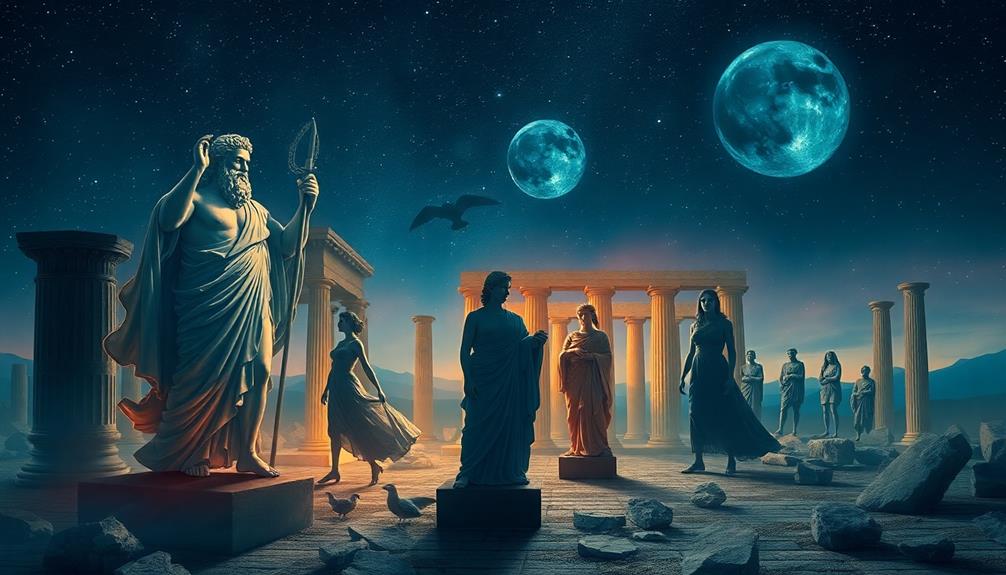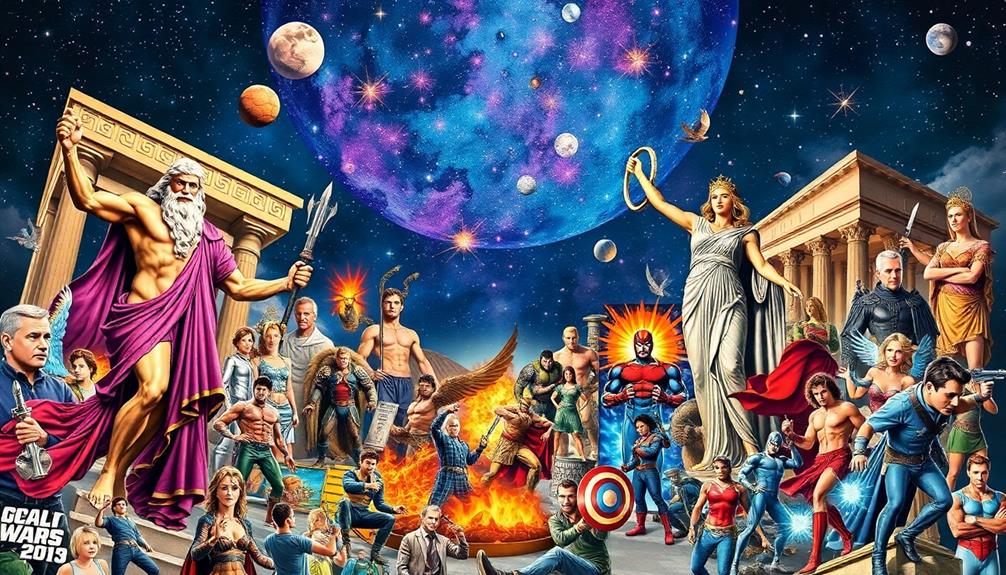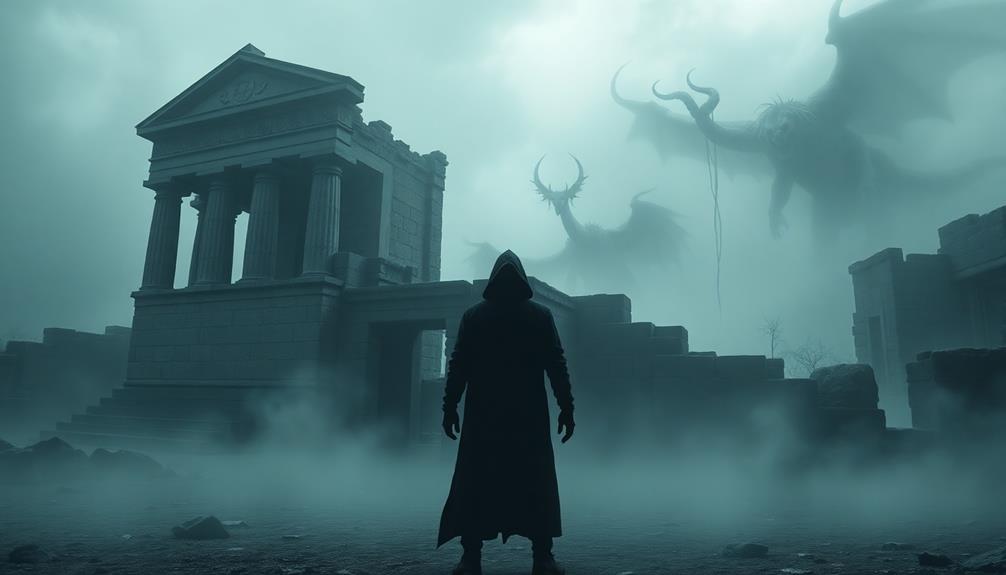Greek myths reflect human nature by illustrating complex emotions and psychological archetypes. Characters like Zeus and Athena embody authority and wisdom, while the Hero's Journey shows personal growth and transformation. You see themes of mortality and rebirth in stories like Persephone's, reminding you of life's cyclical nature. Myths also highlight various human behaviors, from love and jealousy to ambition and resilience, providing moral lessons that shape our values. These narratives create a mirror for your own struggles and aspirations, revealing deep insights into the psyche. Explore further, and you'll uncover more fascinating connections between myth and human nature.
Key Takeaways
- Greek myths illustrate psychological archetypes, such as the Hero's Journey, reflecting human development and introspection through characters like Hercules and Odysseus.
- Major deities in myths, like Zeus and Athena, symbolize core human traits, representing authority, wisdom, and the complexities of human relationships.
- The themes of transformation and mortality in stories, such as Persephone's, highlight the cyclical nature of life and the challenges of personal growth.
- Myths explore complex emotions and motivations, exemplified by figures like Odysseus and Icarus, showcasing the struggle between desire, duty, and ambition.
- Greek mythology informs modern psychology, providing archetypes and narratives that aid in understanding behavior and facilitate personal growth through therapeutic practices.
Overview of Greek Myths
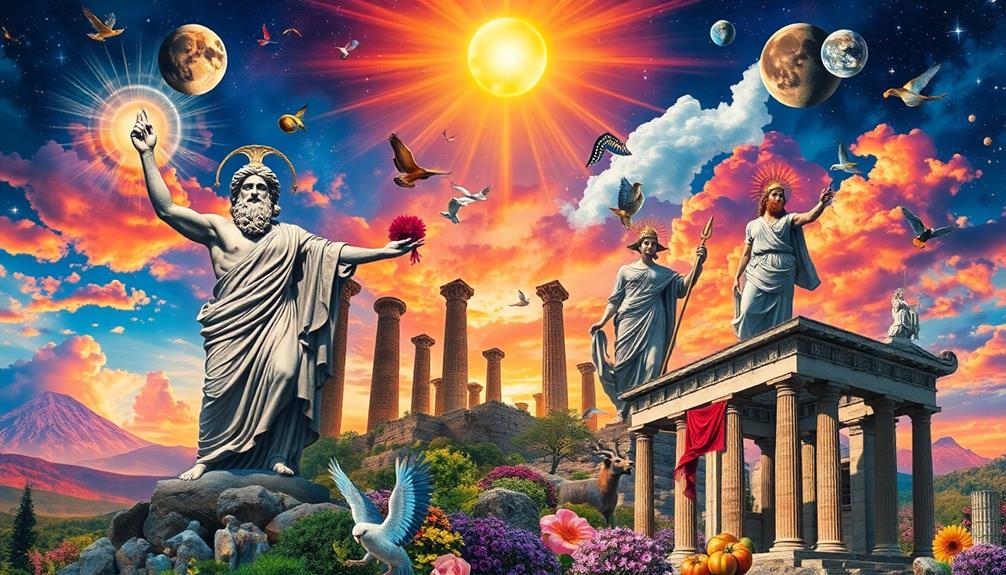
Greek myths are fascinating narratives that explore the depths of human nature and our understanding of the world. These stories, rich with gods, heroes, and mythical creatures, serve as foundational narratives in Western culture. They explain natural phenomena and human behavior, showcasing how ancient societies sought to make sense of their experiences through vivid tales.
Key figures like Zeus, Hera, and Poseidon embody various aspects of human nature, reflecting traits such as power, jealousy, and emotional turbulence. As you investigate these myths, you'll notice prevalent themes of fate, hubris, and morality that mirror the complexities of the human experience. Each story reveals the consequences of individual actions, serving as cautionary tales that resonate even today.
Famous myths, like Pandora's box and the adventures of Theseus, illustrate the intricate interplay between human desires and the challenges we face. They not only entertain but also impart moral lessons, shaping societal values and norms in ancient Greece.
Psychological Archetypes in Myths
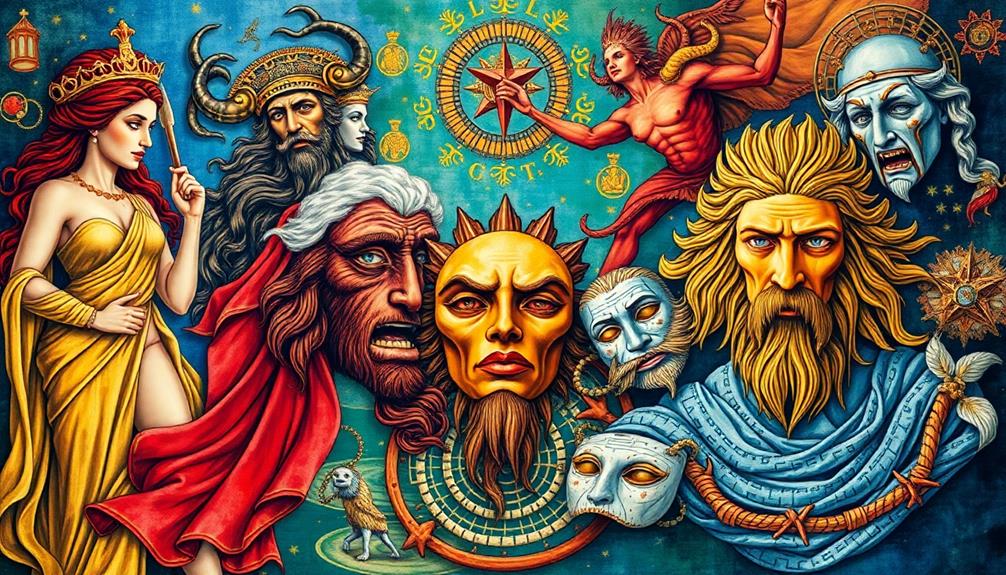
In exploring Greek myths, you'll encounter powerful psychological archetypes like the Hero's Journey, which illustrates personal transformation through trials.
You'll also see the dynamics of Shadow and Persona, highlighting the conflict between our true selves and societal expectations.
Additionally, the representation of Anima and Animus reveals the complexities of gender and identity, challenging you to reflect on your own inner landscape.
Hero's Journey Archetype
The Hero's Journey archetype serves as a powerful lens through which you can understand both mythological narratives and your own personal growth. Defined by Joseph Campbell, this archetype outlines a universal narrative structure where heroes venture from their ordinary world into domains of trials, ultimately returning transformed.
In Greek mythology, figures like Hercules and Odysseus embody this journey, confronting internal and external challenges that reflect human struggles. Engaging in online communities can provide additional support and motivation as you navigate your own hero's journey, fostering collaboration and shared experiences.
As you examine the stages of the Hero's Journey—such as the call to adventure, crossing the threshold, facing trials, and achieving atonement—you'll see how these experiences mirror your own psychological processes of development. Each stage resonates within you, inviting introspection and facilitating growth. You might recognize your own calls to adventure, moments when you faced significant challenges, or periods of transformation.
Carl Jung's concept of archetypes suggests that the Hero's Journey resonates within the collective unconscious, influencing your identity formation. By engaging with this archetype, you can foster resilience and a sense of purpose, using the lessons from Greek myths to navigate your path through adversity and emerge stronger on the other side.
Shadow and Persona Dynamics
Understanding the Hero's Journey offers a foundation for exploring deeper psychological dynamics within myths, particularly the interplay between the Shadow and Persona. The Shadow, a concept introduced by Carl Jung, represents those unconscious aspects of yourself that you often repress. Mythological figures like Hades illustrate this darkness, embodying the underworld and the hidden facets of human nature.
Conversely, the Persona reflects the identity you present to the world, as seen in Hermes, the Greek god of communication and social interactions.
In many myths, characters grapple with their Shadow, like Persephone, who navigates her dual roles as the goddess of spring and queen of the underworld. This change highlights the integration of conflicting aspects of self.
Greek myths also show heroes like Heracles confronting their darker impulses while aiming to uphold public virtues, emphasizing the struggle for self-acceptance and authenticity.
Anima and Animus Representation
Greek myths offer a rich tapestry of characters that embody the psychological archetypes of Anima and Animus, revealing the complex interplay of feminine and masculine energies within the psyche. You'll find that figures like Athena represent the Anima, showcasing qualities such as wisdom and nurturing, while Zeus embodies the Animus, symbolizing authority and power.
These myths often illustrate how these archetypes interact, reflecting the balance of gender qualities within human nature.
Take the myth of Persephone and Hades, for instance. Persephone's descent into the underworld signifies the Anima's journey through unconscious domains, emphasizing transformation and the integration of feminine aspects into consciousness.
Then there's the story of Psyche and Eros, which highlights the need to reconcile Anima and Animus within yourself, illustrating the path toward wholeness and authentic love.
Characters like Hera and Ares further explore these themes, embodying the complexities of jealousy, power, and conflict. Such narratives mirror your internal struggles in the quest for identity and fulfillment, reminding you that the integration of Anima and Animus is essential for psychological balance and personal growth.
Major Deities and Their Symbolism
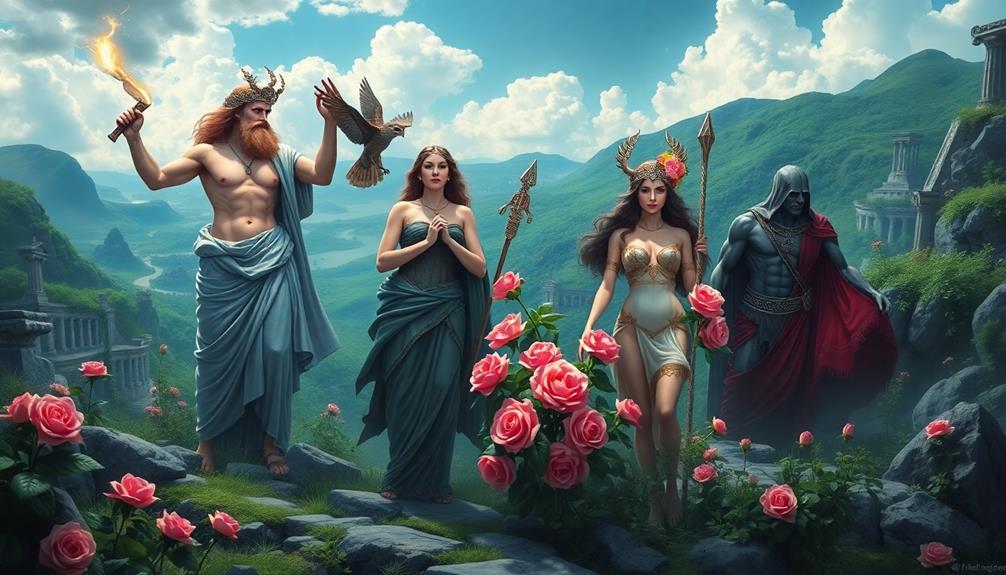
When you explore the major deities of Greek mythology, you'll uncover rich symbolism that reflects key aspects of human nature.
Each god and goddess embodies emotional archetypes that resonate with your own experiences, from Zeus's authority to Dionysus's celebration of chaos.
Understanding these deities can offer you insights into the complexities of relationships and the human condition.
Symbolism of Key Deities
In the domain of Greek mythology, each major deity embodies unique aspects of human experience and psychology, offering insights into our nature. The gods and goddesses reflect various psychological significances that resonate deeply with everyday life.
For example, Zeus, as the leader of the gods, symbolizes authority and cosmic order, mirroring our inner need for structure and paternal guidance. Hera, the goddess of marriage, highlights themes of fidelity and validation, revealing the complexities of relationships and the emotions like jealousy that often arise.
Poseidon, the god of the sea, represents emotional turbulence, guiding you to navigate your subconscious depths. His symbolism encourages resilience amid psychological challenges.
Athena stands as a beacon of wisdom and strategy, embodying the pursuit of knowledge and the balance between intellect and action, urging you to resolve conflicts wisely.
Finally, Dionysus, associated with joy and madness, symbolizes the dance between order and chaos, inviting you to explore creativity and emotional liberation.
Together, these deities provide a rich tapestry of symbolic meaning, reflecting the multifaceted nature of human psychology.
Emotional Archetypes in Mythology
Many emotional archetypes in mythology resonate with our personal experiences, allowing us to connect deeply with the stories of major deities. The Greek gods embody different aspects of human emotion, reflecting our struggles, desires, and triumphs.
| Deity | Symbolism | Emotional Aspect |
|---|---|---|
| Zeus | Authority and power | Desire for order and control |
| Hera | Marriage and family | Fidelity, jealousy, and validation |
| Poseidon | Subconscious and emotional turmoil | Maneuvering through deep-seated feelings |
| Athena | Wisdom and strategic thinking | Balance between intellect and action |
Themes of Transformation and Mortality
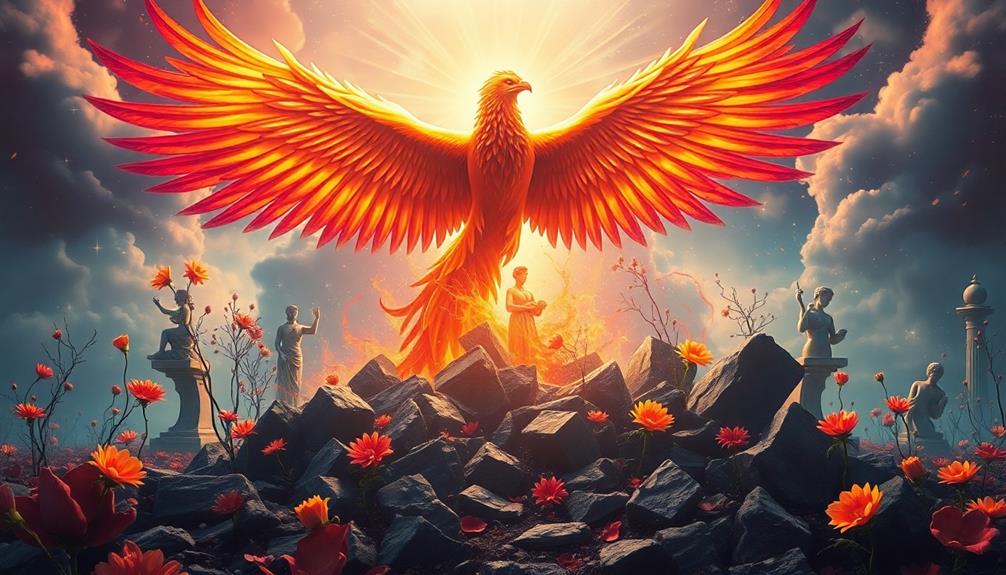
Transformation and mortality intertwine frequently in Greek mythology, revealing deep insights into the human experience. As you explore the story of Persephone, you see her descent into the Underworld and return symbolize life, death, and rebirth's cyclical nature. This transformation resonates with your own understanding of existence, connecting you to deeper emotional truths.
Hades, representing mortality, emphasizes the necessity of confronting death and the transformative journey through grief. You can find liberation in Dionysus, the god of wine, who encourages you to embrace chaos and foster personal transformation through creativity.
The tale of Orpheus and Eurydice highlights the struggle with loss and illustrates how love and art can be powerful tools in coping with mortality.
Similarly, Achilles' narrative challenges you to contemplate your own fate, weighing the choice between a long, uneventful life and a short, glorious one. This tension between legacy and the inevitability of death invites you to reflect on your values and the impact of your choices.
Greek myths serve as mirrors, inviting you to engage with themes of transformation and mortality, ultimately enriching your understanding of the human condition.
Myths and Human Behavior

Exploring Greek myths reveals profound insights into human behavior, illustrating a range of complex emotions and motivations. These myths and legends capture the essence of human beings, showcasing themes like love, jealousy, ambition, and vengeance.
Take Aphrodite, Hera, and Zeus, for example; their stories reflect the intricacies of relationships and the impact of emotions on decision-making.
The character of Odysseus embodies the struggle between desire and duty, demonstrating cleverness and resilience as he navigates life's challenges. Similarly, the tale of Icarus serves as a cautionary reminder about the perils of hubris and overreaching ambition, highlighting human limitations that many can relate to.
The Hero's Journey, illustrated by figures like Perseus and Heracles, emphasizes essential elements of human growth, transformation, and the quest for identity, resonating deeply with your own experiences.
Additionally, psychological complexes rooted in these myths, such as the Adonis and Electra Complexes, mirror societal norms and individual behaviors concerning beauty and relationships.
In this way, Greek myths not only entertain but also provide a mirror reflecting the complexities of human behavior, offering valuable lessons that remain relevant today.
Cultural Significance of Myths
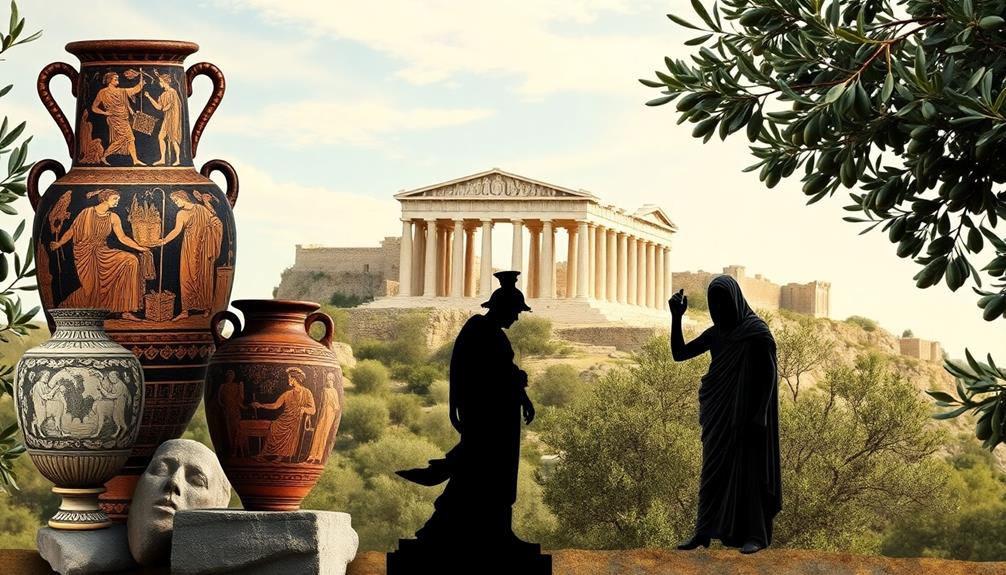
How do Greek myths shape cultural values and identity? Greek myths act as powerful cultural touchstones that reflect the societal values and norms of ancient Greece. You'll find that these stories provided moral lessons, helping communities navigate ethical dilemmas and instilling essential cultural values.
| Aspect | Description |
|---|---|
| Moral Lessons | Myths conveyed important ethical dilemmas. |
| Shared Identity | They fostered a sense of belonging among Greeks. |
| Daily Life | Myths influenced rituals and religious practices. |
| Enduring Influence | Their impact is seen in modern literature and art. |
These narratives not only guide behavior but also reinforce a collective identity across generations. The intertwining of myths with daily life highlights their cultural significance, shaping everything from social structures to religious practices. Even today, the relevance of Greek mythology endures, resonating in discussions within modern psychology and the arts. By exploring these myths, you gain insight into the values that continue to influence contemporary culture, showcasing their lasting legacy in our understanding of human nature.
Influence on Modern Psychology
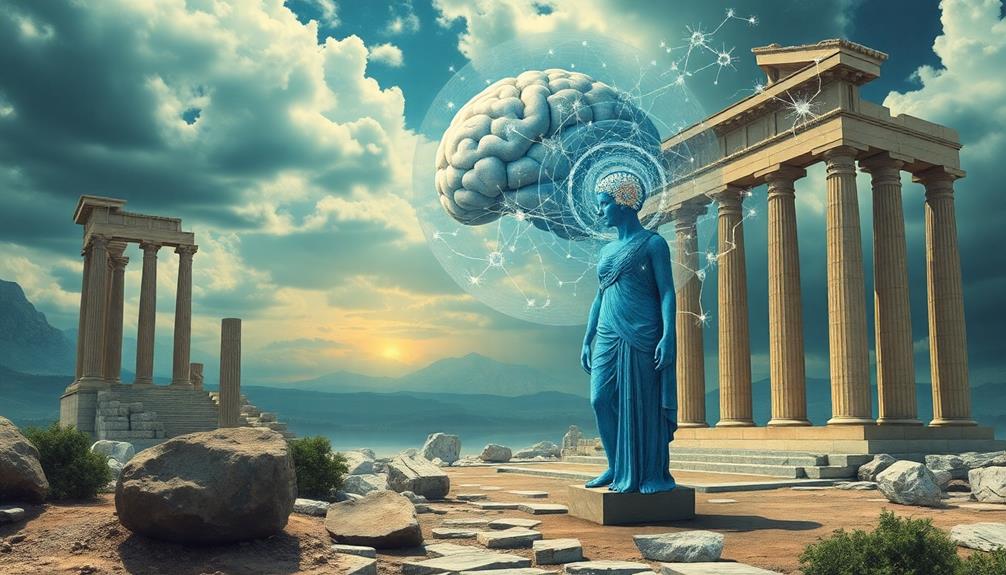
Greek mythology frequently influences modern psychology, providing a rich source of concepts that help us understand human behavior and emotional experiences. You might find that figures like Zeus and Athena serve as archetypes of authority and wisdom, guiding therapeutic practices.
Carl Jung's theory of the collective unconscious emphasizes how mythological narratives resonate with your psychological experiences, highlighting shared symbols and motifs that connect us all.
The hero's journey, a central theme in Greek myths, has become a powerful tool in modern therapy, aiding in personal growth and identity formation. You can see how stories like Oedipus illustrate psychological complexes, shaping psychoanalytic theories that explore familial relationships and inner conflicts. These narratives help you make sense of your own experiences and relationships.
Moreover, the cathartic elements embedded in these myths find their way into therapeutic techniques, allowing you to experience emotional release through storytelling.
Frequently Asked Questions
How Does Psychology Relate to Greek Mythology?
Psychology relates to Greek mythology by illustrating universal themes and archetypes. You'll find that these myths reveal deep emotions and conflicts, helping you understand personal growth, familial dynamics, and the complexities of human relationships.
How Does Human Psychology Affect the Nature of Myths?
Human psychology shapes myths by embedding universal themes and archetypes, reflecting your experiences and conflicts. These stories resonate with you, offering insights into motivations, fears, and desires while helping to articulate complex emotional landscapes.
What Are Psychological Interpretations of Myths?
Psychological interpretations of myths reveal universal themes and archetypes that resonate with your experiences. They help you understand deep-seated desires, conflicts, and emotional complexities, guiding you through personal growth and the navigation of life's challenges.
How Does Greek Mythology Relate to Nature?
When you think about Greek mythology, you see how it captures nature's essence. Stories like Demeter's and Poseidon's illustrate humanity's connection to natural forces, reminding you to respect both their beauty and unpredictability.
Conclusion
As you explore the rich tapestry of Greek myths, you can't help but notice how they mirror the complexities of human nature. Each deity, each tale, pulls you deeper into a world where transformation and mortality intertwine. What if these ancient stories hold the key to understanding your own behavior? The echoes of these myths still resonate today, leaving you to wonder: how will their lessons shape your journey? Keep exploring, because the answers might surprise you.
